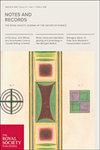进化的精神:阿拉贝拉·巴克利进化史诗中的道德与互惠主义
IF 0.6
3区 哲学
Q3 HISTORY & PHILOSOPHY OF SCIENCE
Notes and Records-The Royal Society Journal of the History of Science
Pub Date : 2017-12-20
DOI:10.1098/rsnr.2016.0056
引用次数: 3
摘要
查尔斯·达尔文的同时代人对他的自然选择理论与宗教和道德的调和存在分歧。虽然阿尔弗雷德·拉塞尔·华莱士作为一个反对道德的自然起源的自然选择的唯灵论倡导者而脱颖而出,但科学普及者和唯灵论者阿拉贝拉·巴克利(1840-1929)提供了一个更有代表性的例子,说明有神论者,无论是唯灵论者还是更正统的宗教,是如何找到和解的。与华莱士不同的是,巴克利强调道德和灵魂的合法进化,这是借鉴了传道者的神学传统。值得注意的是,巴克利主张对达尔文的进化论,特别是道德的进化,进行一种互惠主义和深刻的有神论解释,而不牺牲自然法则的统一性。虽然巴克利对进化史诗的理解被认为是强调互惠主义(Gates 1998)和唯心主义神学(Lightman 2007),但在这里,我证明了她对这场辩论的独特补充在于她的统一理论。与其他作者相比,我认为通过巴克利,我们可以更好地将维多利亚时代的唯心论理解为一种宗教,而不是一门神秘的科学。然而,这是一种宗教的概念,通过她的进化主义,架起了科学和唯心论的桥梁。这为历史学家提供了一幅更复杂但令人满意的达尔文之后维多利亚时代世界观的图像。本文章由计算机程序翻译,如有差异,请以英文原文为准。
The evolving spirit: morals and mutualism in Arabella Buckley's evolutionary epic
Contemporaries of Charles Darwin were divided on reconciling his theory of natural selection with religion and morality. Although Alfred Russel Wallace stands out as a spiritualist advocate of natural selection who rejected a natural origin of morality, the science popularizer and spiritualist Arabella Buckley (1840–1929) offers a more representative example of how theists, whether spiritualist or more orthodox in their religion, found reconciliation. Unlike Wallace, Buckley emphasized the lawful evolution of morality and of the soul, drawing from the theological tradition of traducianism. Significantly, Buckley argued for a mutualistic and deeply theistic interpretation of Darwinian evolution, particularly the evolution of morals, without sacrificing the uniformity of natural law. Though Buckley's understanding of the evolutionary epic has been represented as emphasizing mutualism (Gates 1998) and spiritualist theology (Lightman 2007), here I demonstrate that her distinctive addition to the debate lies in her unifying theory of traducianism. In contrast to other authors, I argue that through Buckley we better understand Victorian spiritualism as more of a religion than an occult science. However, it was a conception of religion that, through her evolutionary traducianism, bridged science and spiritualism. This offers historians a more complex but satisfying image of the Victorian worldview after Darwin.
求助全文
通过发布文献求助,成功后即可免费获取论文全文。
去求助
来源期刊
CiteScore
1.50
自引率
0.00%
发文量
45
审稿时长
>12 weeks
期刊介绍:
Notes and Records is an international journal which publishes original research in the history of science, technology and medicine.
In addition to publishing peer-reviewed research articles in all areas of the history of science, technology and medicine, Notes and Records welcomes other forms of contribution including: research notes elucidating recent archival discoveries (in the collections of the Royal Society and elsewhere); news of research projects and online and other resources of interest to historians; essay reviews, on material relating primarily to the history of the Royal Society; and recollections or autobiographical accounts written by Fellows and others recording important moments in science from the recent past.

 求助内容:
求助内容: 应助结果提醒方式:
应助结果提醒方式:


